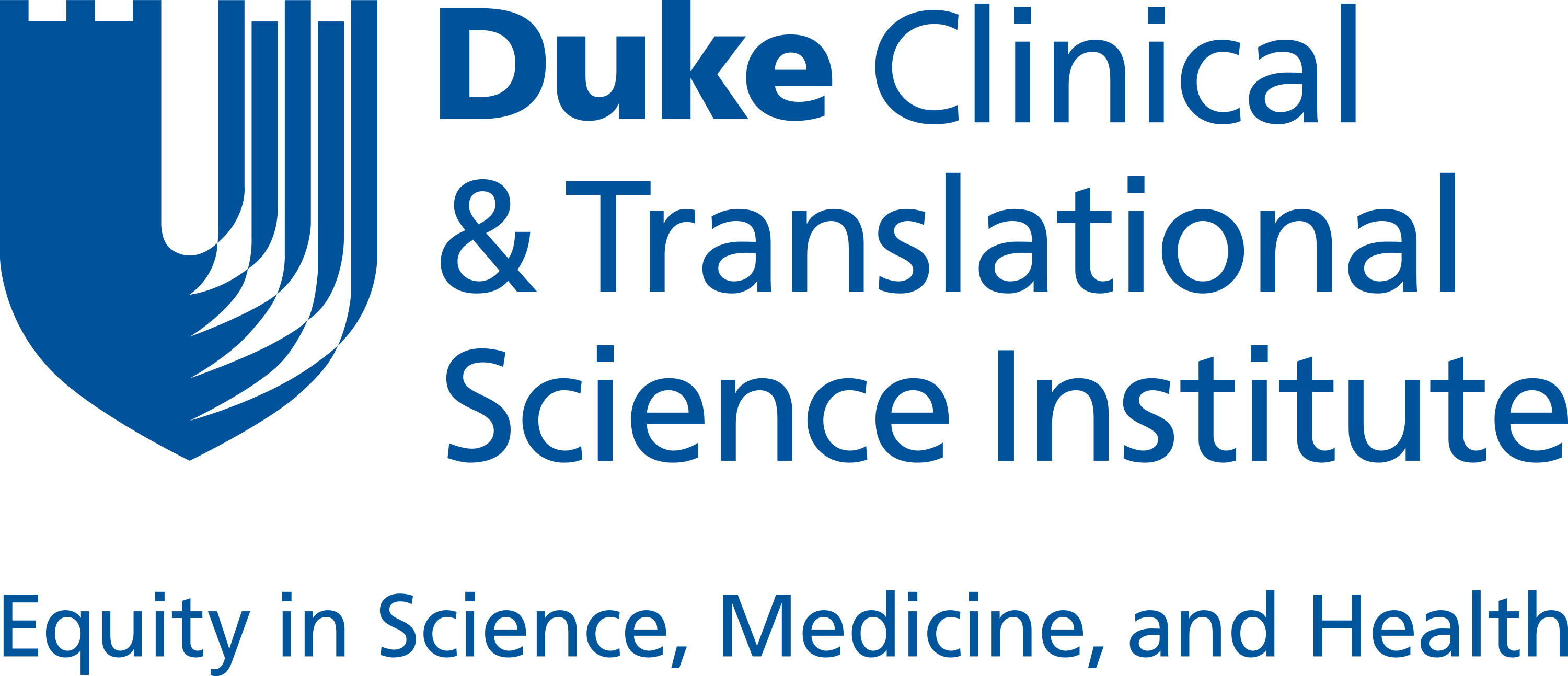CTSI Translational Impact: Agility and Equity in Action
Our Impact Areas:

CTSI quickly stood up COVID-19 research projects by leveraging the MURDOCK Study, Duke’s groundbreaking longitudinal health research initiative based in Kannapolis, N.C.
Rapidly Responding to the COVID-19 Pandemic
The research landscape at Duke has evolved to meet the challenge of the pandemic. CTSI efforts have focused on empowering researchers to quickly launch projects to study the disease and facilitating community collaborations to address the societal impact of the pandemic.
COVID-19 Research Highlights
- As a far-reaching convener and resource within the institution and beyond, the CTSA program at Duke was called upon for coordination, resources, and leadership. Using MyResearchHome (a tool created by the CTSA), CTSI staff developed the COVID-19 Research & Activities Registry, an online data collection tool, and within one week, the registry had more than 100 responses.
- The Translational Population Health Research group launched two new cohorts of the MURDOCK Study: the MURDOCK C3PI Study to understand the community prevalence of COVID-19 and monitor the disease over time, and the MURDOCK COPE Study to understand how the responses, perceptions, and experiences of participants and their families changed due to the pandemic and associated regulations.
- CTSI personnel led the creation of a centralized website to help the public participate in COVID-19 research and get information about testing.
- The Duke CTSI Clinical Data Research Networks program identified Deverick Anderson, MD, MPH, as site Principal Investigator for the Healthcare Worker Exposure Response and Outcomes (HERO) registry that seeks to rapidly identify and enroll a large community of healthcare workers at high risk for COVID-19 infection.
- The CovIdentify study is seeking to predict early cases of COVID-19 infections in people and ultimately monitor the spread of the coronavirus by using data generated by wearable smart devices.
- Medicine + Engineering at Duke (Duke MEDx) awarded two CTSI projects with COVID-19 Pilot Project Awards to support research that can only be conducted during the pandemic or support development of technologies that could benefit COVID-19 patients or Duke’s return to campus efforts.
By the summer of 2020 it was clear that the COVID-19 pandemic was disproportionately affecting communities of color. CTSI faculty and staff mobilized quickly to convene working groups with both Duke and community grassroots stakeholders to address disparities, barriers, and challenges in the Latinx, Black, and African American communities.
COVID-19 Health Equity Highlights:
- CTSI faculty and staff have been deeply involved with LATIN-19, a group of concerned stakeholders advocating for Hispanic and Latinx communities statewide, and with the African American COVID Taskforce Plus (AACT+), doing similar work in the Black and African American communities.
- In late May 2020, CTSI hosted a Research Symposium — “A Call to Action: Identifying Next Steps to Address Biomedical, Health Care, and Social Drivers of COVID-19 Disparities.”
- CTSI Community Engagement and Anti-Bias, Anti-Racism, and Equity in Research Groups co-hosted (in partnership with the REACH Equity Center): “Strategies and Best Practices for Enrolling Black and Latinx Americans in COVID-19-related Clinical Research.”
- Like most groups across Duke, CTSI had to figure out how to work amid the COVID-19 pandemic. Our teams used this opportunity to explore innovative ways to support communities in Duke, Durham, and beyond.
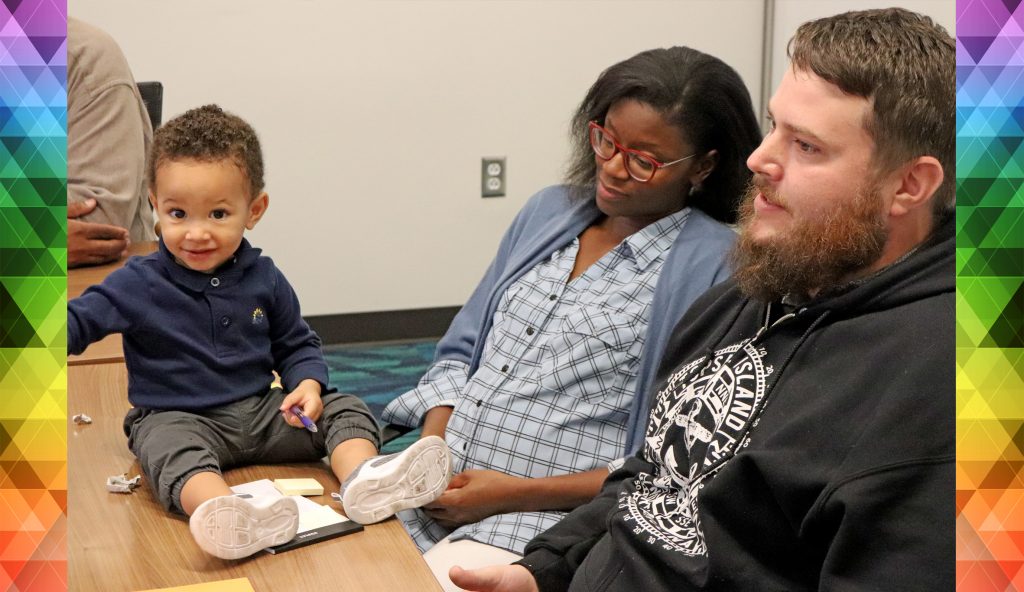
A Durham family participates in a session with Duke researchers, giving feedback on study design.
Centering Equity, Diversity, and Inclusion
From the beginning, CTSI’s mission has included changing the paradigm in translational research by actively seeking to support scholarship, career development, and funding opportunities for underrepresented ethnic group (UREG) investigators. This commitment to diversity and inclusivity extends internally as well, as CTSI has worked to center equity in our institutional culture.
- CTSI launched the new Center for Equity in Research and its supporting Equity in Research core to provide infrastructure support for equity, anti-bias, and anti-racism across the research environment and to shift the research culture toward proactive and robust planning for diversity, equity, and inclusion.
- CTSI launched new pilot program, the Multidisciplinary Vision Program, to fund health equity research.
- The Duke CTSA KL2 program exceeded its goals in recruitment of underrepresented ethnic groups for research opportunities and awards, and was named a top-performing hub in the nation.
- CTSI collaborated with Duke’s Office for Diversity and Inclusion (ODI) in the School of Medicine to develop and implement our longitudinal equity strategy. Programs and activities include the execution of the CTSI Climate Survey, now adopted by Duke, and piloting the Teaching and Leading Equity Now curriculum for all staff, faculty, and learners.
- CTSI leadership, in partnership with ODI and the Duke Center for Truth and Racial Healing and Transformation, held an Equity Retreat and town halls to present CTSI Climate Survey findings, and foster shared language around anti racism, anti bias, and equity as an integral part of designing a roadmap toward equity.
- A series of comprehensive surveys completed during the summer helped CTSI leadership to understand the attitudes, experiences, and concerns of CTSI personnel regarding racism, discrimination, and equity. The survey findings are informing key services and activities to promote a safe and equitable an environment.
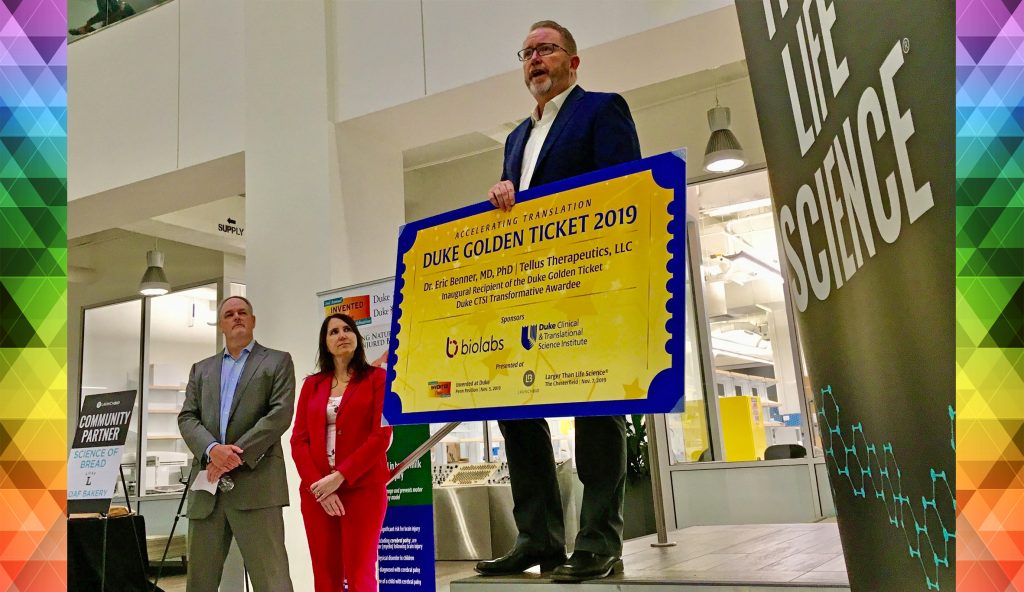
Dr. Eric Benner receives the inaugural Duke Golden Ticket award at the Chesterfield Building in Durham, NC. The award was given to support Benner’s groundbreaking therapy for treating and reversing infant brain injuries.
Catalyzing Discovery and Research
Even in the midst of the pandemic, CTSI maintained focus on its mission to advance scientific discovery that will improve human health and health equity by holistically supporting research from early stages in the lab all the way to patients and communities.
- Dr. Eric Benner was awarded the first-ever Duke Golden Ticket to advance a groundbreaking brain injury therapy toward clinical trials.
- A Duke startup, Deep Blue Medical, received FDA clearance to take its hernia mesh product to market after receiving CTSI funding in the development phase.
- CTSI’s collaborative pilot program with North Carolina Central University (NCCU) has yielded six new inter-institutional research teams studying cancer treatment, drug delivery, population health, and other domains.
- A Duke-NCCU collaborative research team secured follow-on funding from NC Biotech Center for their drug delivery innovation.
- Duke investigators Tina Tailor, MD and Melissa Daubert, MD used CTSI’s Clinical Data Research Networks to conduct multi-site studies illuminating little-known health disparities in cardiology and OBGYN care.
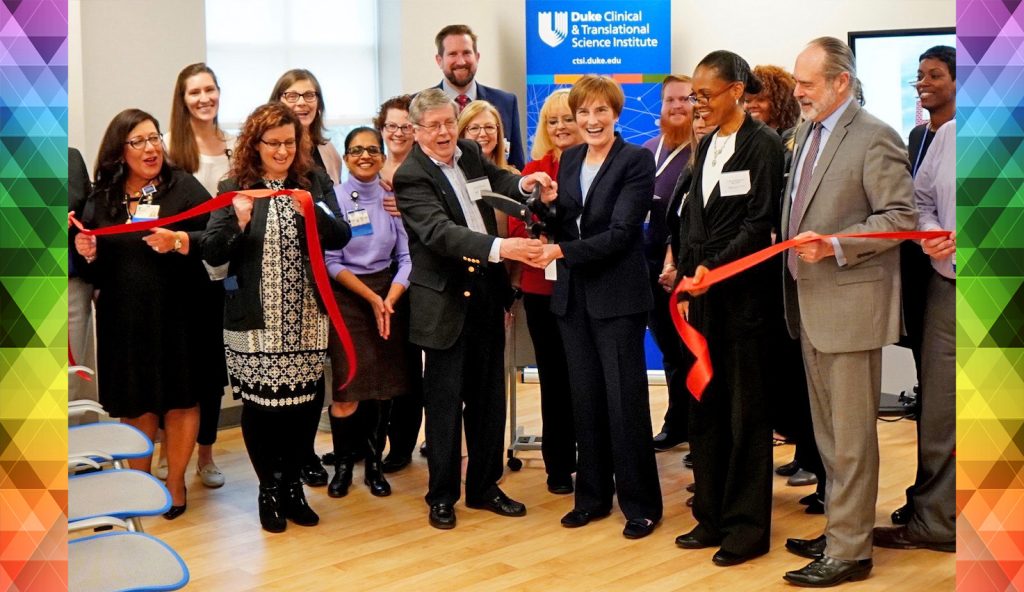
Dr. L. Kristin Newby and Dr. Ebony Boulware celebrate with the TransPop team and community stakeholders during the ribbon-cutting ceremony for Duke CTSI’s space expansion at the NC Research Campus.
Accelerating Innovation
The future of translational science will require highly collaborative inter-disciplinary research teams and flexible tools to support those teams. In 2020, CTSI ramped up its efforts to build infrastructure, capacity, and knowledge to lead the next era of research.
- A team of CTSI faculty and staff designed and hosted the 2020 International Science of Team Science Conference, presenting a robust program of cutting-edge scholarship while setting records for attendance as one of the first science conferences to pivot online due to the pandemic.
- CTSI doubled its space at the NC Research Campus in Kannapolis, increasing capacity for high-impact, community-engaged research.
- CTSI supported the creation and launch of MyResearchPath, an innovative roadmap to conducting research at Duke, expanding the functionality of the MyResearch suite of tools.
- CTSI’s Mobile App Gateway group helped produce two award-winning apps: The Talk, which promotes sexual health among Black male adolescents in the South, and Caremap, which helps families coordinate their children’s healthcare needs.
- CTSI investigators partnered with the Duke Institute for Health Innovation to pioneer machine learning algorithms to identify hospital inpatients at risk of sepsis. Since 2019, active dashboards have been used by hospital care teams in the Duke Health system.
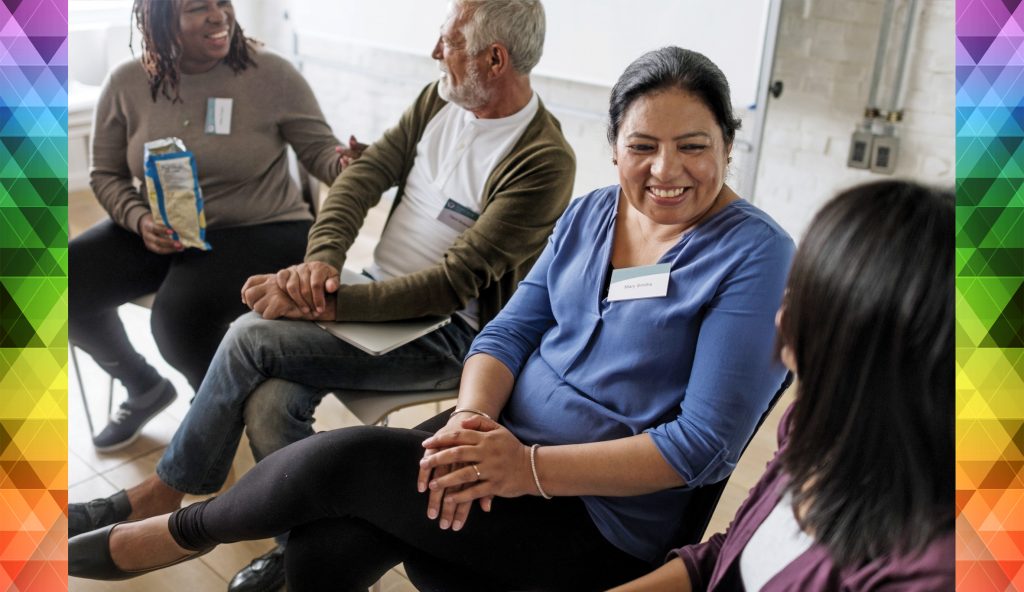
CTSI works to foster and strengthen collaboration between community members, community-based organizations, and academic researchers.
Strengthening Community Connections and Resilience
In a year of enforced isolation, building connections was more important than ever. CTSI is committed to facilitating equitable and robust community-engaged health research by connecting academic stakeholders with community partners locally, regionally, and nationally.
-
- CTSI partnered with North Carolina Central University (NCCU) on a number of projects to advance translational research and strengthen ties with the community. One such initiative, NCCU ethnodramas, are designed to educate community members about important health topics, including diabetes and COVID-19.
- The Kannapolis-based MURDOCK Study celebrated its 10th anniversary in 2019. In that time, the study’s Community Registry and Biorepository grew to more than 12,500 participants and 450,000 biological samples.
- The Community Engaged Research Initiative (CERI) has put their expertise and close partnerships with community members, community-based organizations, and academic researchers to work, disseminating information about the latest evidence-based research regarding COVID-19 and the different vaccines in order to help alleviate the disproportionate negative effects of the virus in local communities. CERI has also facilitated community engagement in COVID-19 research at Duke, helping to promote scientific equity for historically marginalized populations.
- The partnership between NCCU and CTSI is designed to leverage the strengths of both institutions to advance translational science and improve health outcomes, particularly for those health issues that disproportionately impact underserved and underrepresented communities. With the onset of the COVID-19 pandemic, researchers at Duke and NCCU have worked together to address new health challenges that have intensified as a result of the pandemic.
- Community engagement is vital to the new Equity in Research core, which is working to identify and anticipate community barriers to access while creating sustainable change throughout the research enterprise at Duke.
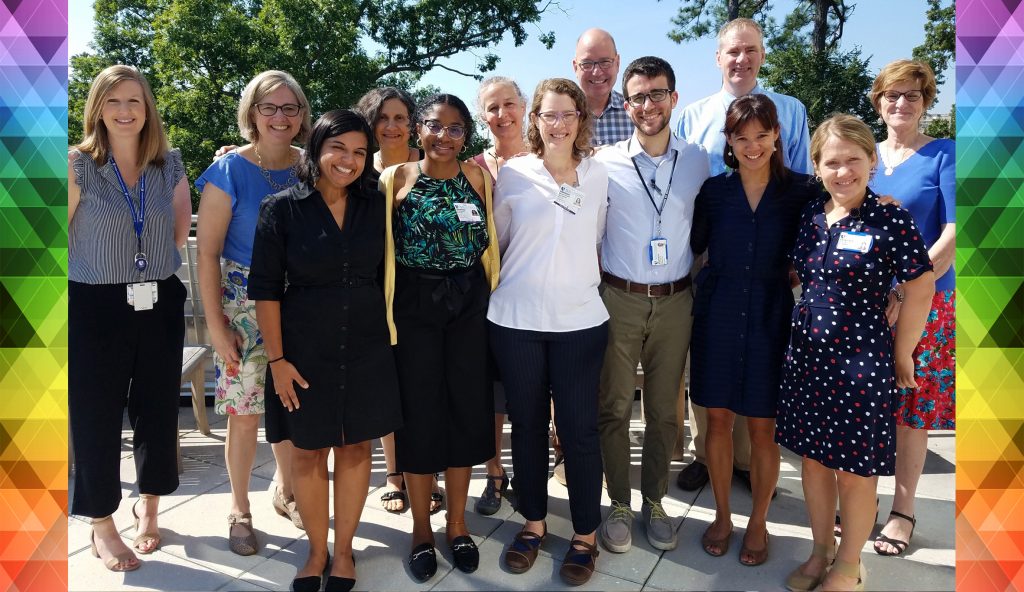
Duke’s National Clinician Scholars Program (NCSP) welcomed its first cohort of scholars on July 1, 2019. The NCSP currently comprises six sites at institutions across the nation, offering unparalleled training for clinicians as change agents driving policy-relevant research and partnerships to improve health and health care.
Transforming Education and Training
CTSI supports the advancement of the next generation of interdisciplinary research leaders, offering an evolving portfolio of educational and training opportunities to address the needs of Duke staff, students, and faculty.
- Duke became a site for the National Clinician Scholars Program (NCSP). Since its inceptions, the Duke NCSP program has welcomed three cohorts of students focused on policy-relevant research and partnerships to improve health and health care.
- CTSI began supporting the Engagement, Recruitment, and Retention Certificate Program, a skills-building program designed for clinical research study teams to help staff develop and expand competency in participant engagement, recruitment, and retention.
- CTSI supported North Carolina Central University in the successful launch of its clinical research certificate program in spring 2020, graduating 9 students as of spring 2021; all 9 of those graduates have since become employed in clinical research. CTSI continues to provide assistance in course development and content and is exploring means for facilitating the placement of NCCU students in clinical research internships at Duke as part of their degree program.
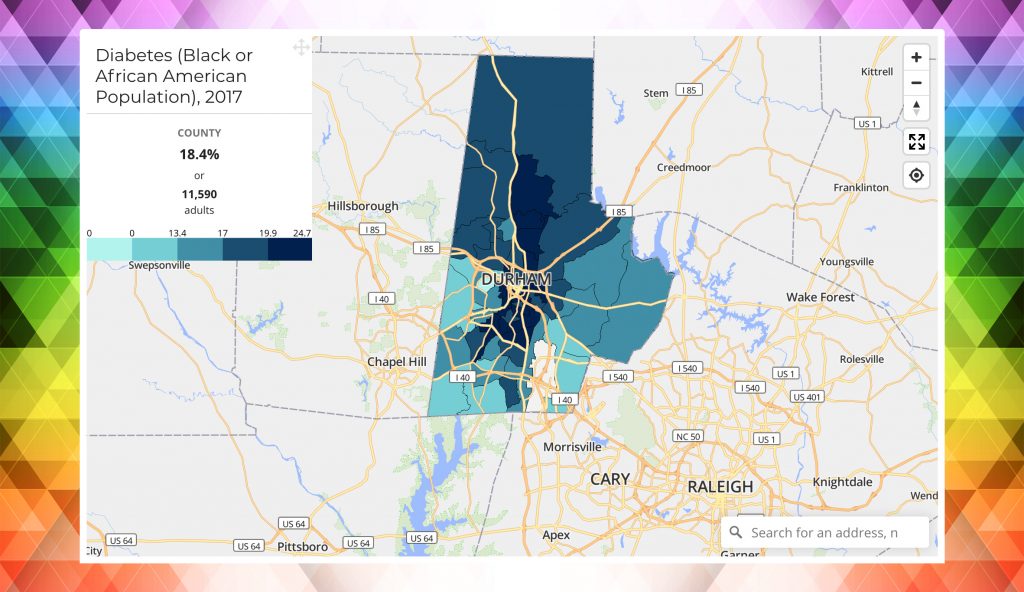
The Durham Neighborhood Compass is a primary community resource that allows users to track changes in the community with data.
Building Access to Data with Integrity and Transparency
Data science increasingly drives decision-making in health care and translational science, bringing with it both new possibilities for better care, and new concerns about issues such as algorithmic bias. CTSI is supporting innovative work in this field to ensure that cutting-edge data science also advances health equity.
- In the early months of the COVID-19 pandemic, the CTSI’s Data Science and Informatics Cores created an Integrated Data Repository for COVID-19 related research to help make more genomic data available to the research community.
- Guided by CTSI leadership, Duke joined a larger collaborative run by the NIH’s National Center for Advancing Translational Science that attempts to make COVID-19 research at institutions like Duke easier. The National COVID Cohort Collaborative (N3C) has EHR data from more than 40 institutions available for Duke faculty to study COVID-19.
- The creation of Duke’s Clinical Research Data Mart (CRDM) provides researchers with a set of consistently defined data elements to better understand the health and well-being of patients served by DUHS and Lincoln Community Health Center.
- The first-of-its-kind 1000 Patient Project (1KP) at Duke aggregates clinical, sample, and assay data that enables researchers to quickly find a cohort of participants with readily available data for analysis.
- The Duke Data and Analysis Resource Center (DARC) maintains a catalog of data resources to enable Duke researchers find the appropriate data from entities across the School of Medicine, Duke Health, and Duke University.
- In partnership with the Center for Community and Population Health Initiative, CTSI has developed a population health data mart and data mapping initiative to promote understanding of community health, build collaborative partnerships within our communities, share data with stakeholders, and work together to improve the health and wellbeing of our communities.
- CTSI teams led the campus-wide Discover Data @ Duke collaborative effort to provide a one-stop shop for Duke investigators to learn about and access a wealth of data resources.
